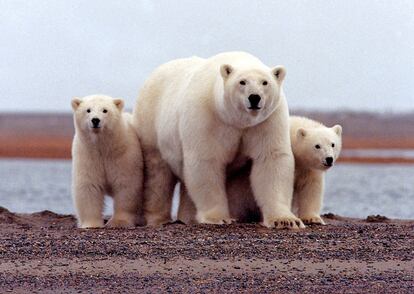US cancels oil drilling leases in Alaska nature preserve
The Biden Administration will scrap contracts in the Arctic National Wildlife Refuge and ban drilling on more than half the National Petroleum Reserve


The U.S. government took a significant step in the fight against climate change and for the protection of a vast wilderness in northeast Alaska on Wednesday, September 6, as officials announced the cancellation of leases granted by the Donald Trump administration for oil and gas development in the Arctic National Wildlife Refuge. It will also ban drilling on more than 13 million acres of the National Petroleum Reserve, nearly half of its total area in the same Arctic part of the state.
But the announcement highlights the complicated juggling act facing Joe Biden’s administration. He must balance his commitment to fighting climate change and respecting the environment with pressures to keep petrol prices down as election year approaches. Hence, the new measures do not apply to the colossal Willow Project in the National Petroleum Reserve, where the Biden Administration granted the oil company Conoco Williams permission to drill earlier this year, despite protests from environmental organizations and criticism from the UN itself. It is estimated that with an expected investment of $8 billion, the project will produce 576 million barrels of oil over the next thirty years.
“When the climate crisis warms the Arctic at more than twice the rate of the rest of the world, we have a responsibility to protect this treasured region for all ages,” Biden said in a statement. “Canceling all remaining oil and gas leases issued under the previous administration in the Arctic Refuge and protecting more than 13 million acres in the western Arctic will help preserve our Arctic lands and wildlife, while honoring the culture, history, and enduring wisdom of Alaska Natives who have lived on these lands since time immemorial.”
Home to polar bears, caribou, moose and grizzly bears, the Arctic Refuge was protected by a strict ban on the exploitation of its natural resources for decades. But during Trump’s presidency, the Republican-majority Congress overturned that policy. In 2017, it ordered the sale of leases for the exploitation of the area, which covers 7.7 million hectares and is estimated to contain enough oil in its subsoil to fill 11 billion barrels. The law passed at that time allowed for two rounds of auctions before the end of 2024.
The sale of the first leases took place in January 2021, in the last days of the Republican Administration’s mandate just before the presidency passed to Democrat Joe Biden whose manifesto included a commitment to protect this natural park. The oil sector showed little interest in the auction of these leases. The highest bidder was a state agency, the Alaska Industrial Development and Export Authority. Two other small companies that acquired leases ended up relinquishing them due to uncertainty about the exploitation program.
On his first day in the White House, Biden signed an executive order halting hydrocarbon extraction in the Arctic. He subsequently suspended the leases issued by the previous administration, arguing that environmental reports indicated problems. The State of Alaska, which considers oil drilling necessary for job creation and revenue, filed a lawsuit against the move; the courts ruled in favor of the government last month, finding that it could suspend the leases while it completed new reports.
Now, the Interior Department has stated that these new reports determine that the studies on which the original decision to sell leases was based contained serious legal flaws, allowing the head of the department, Deb Haaland, to cancel the leases.
Haaland has called climate change “the crisis of our era,” adding, “we cannot look the other way in the face of the disproportionate impact being felt in the Arctic.”
Oil production in Alaska, the largest state in the US, has been gradually declining over the last 30 years. If, in 1988, more than two million barrels a day were extracted, production is now down to less than a quarter of that.
Alaska’s governor, Republican Mike Dunleavy, has vowed to take the decision to court. “We will fight for Alaska’s right to develop its own resources and we will go to court to correct the Biden Administration’s mistake,” he said.
Environmental organizations have, by contrast, praised the administration’s decision. “We commend Secretary Haaland for cancelling unlawfully issued oil-and-gas leases in the Arctic Refuge,” said Abigail Dillen of Earthjustice. “Looking ahead, we hope to see the strongest possible protections for the Refuge and the Western Arctic in the years to come.”
Not all are entirely satisfied, however. Biden’s decision to allow the $8 billion Willow oil drilling project has angered environmentalists. “Small measures like the ones the Department of Interior put forward won’t erase President Biden’s incredibly disappointing climate record with respect to oil and gas leasing,” said Raena Garcia, a senior campaigner with Friends of the Earth. “If the Administration is truly committed to protecting our people and the planet, they will halt climate-destroying projects like Willow altogether.”
Tu suscripción se está usando en otro dispositivo
¿Quieres añadir otro usuario a tu suscripción?
Si continúas leyendo en este dispositivo, no se podrá leer en el otro.
FlechaTu suscripción se está usando en otro dispositivo y solo puedes acceder a EL PAÍS desde un dispositivo a la vez.
Si quieres compartir tu cuenta, cambia tu suscripción a la modalidad Premium, así podrás añadir otro usuario. Cada uno accederá con su propia cuenta de email, lo que os permitirá personalizar vuestra experiencia en EL PAÍS.
¿Tienes una suscripción de empresa? Accede aquí para contratar más cuentas.
En el caso de no saber quién está usando tu cuenta, te recomendamos cambiar tu contraseña aquí.
Si decides continuar compartiendo tu cuenta, este mensaje se mostrará en tu dispositivo y en el de la otra persona que está usando tu cuenta de forma indefinida, afectando a tu experiencia de lectura. Puedes consultar aquí los términos y condiciones de la suscripción digital.








































